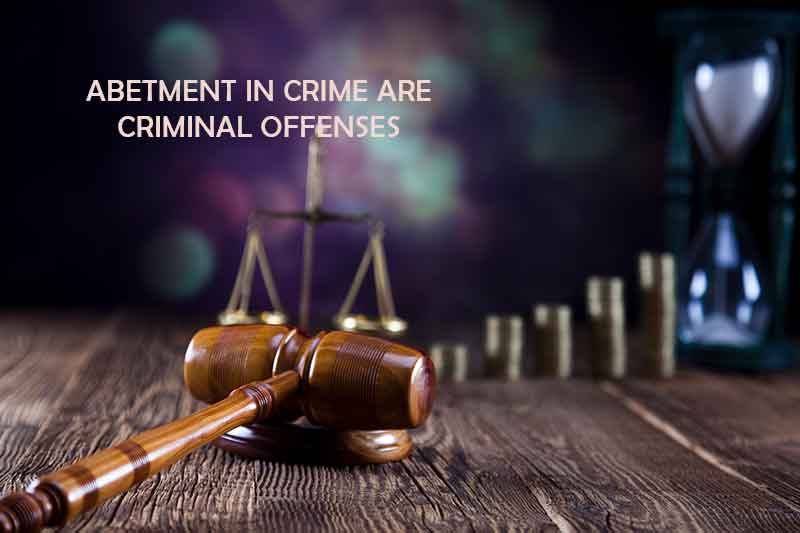The United Arab Emirates maintains a steadfast position on holding individuals accountable for criminal acts, encompassing not only the direct perpetrators but also those who aid or abet in the commission of unlawful activities. The concept of aiding and abetting entails the intentional facilitation, encouragement, or assistance in the planning or execution of a criminal offense. This legal principle ascribes culpability to individuals for their conscious involvement, even if they did not directly perpetrate the crime themselves. Within the UAE’s legal framework, aiding and abetting can result in severe penalties, often commensurate with the punishments prescribed for the principal offense.
Garnering a comprehensive understanding of the ramifications associated with this principle is of paramount importance for residents and visitors alike, as inadvertent actions or omissions can potentially implicate them in criminal proceedings, necessitating a thorough grasp of the relevant legal provisions.
What Constitutes Aiding and Abetting a Crime under UAE Law?
The United Arab Emirates’ current Penal Code, Federal Decree-Law No. 31 of 2021 [On the Issuance of the Crimes and Penalties Law], provides the legal definition of what constitutes aiding and abetting a crime. According to Articles 45 and 46 of this law, a person is considered an accomplice if they intentionally and knowingly assist or facilitate the commission of a criminal act.
Intention and knowledge of the crime are crucial factors in determining accomplice liability under UAE law. Mere presence at the scene of a crime, without active participation or intent to aid the perpetrator, does not automatically constitute aiding and abetting. The extent of an accomplice’s involvement dictates the severity of the penalty they face. Article 46 states that an accomplice may receive the same penalty as the perpetrator or a lesser punishment, depending on the specific circumstances and their level of participation in the criminal act.
Some examples of actions that could constitute aiding and abetting under UAE law include providing weapons, tools or other means to commit the crime, encouraging or instigating the perpetrator, assisting in the planning or execution stages, or helping the perpetrator evade justice after the fact.
It is important to note that the legal interpretations and applications are ultimately at the discretion of UAE judicial authorities on a case-by-case basis.
Izingxenye Zokugoba
Ukuze isenzo sifaneleke njengesinxephezelo, izici ezimbili ezibalulekile kufanele kuhlangatshezwane nazo:
- Actus Reus (Umthetho Wecala): Lokhu kubhekisela ezenzweni ezithile zokushoshozela, ukusebenzelana uzungu, noma ukusiza ngamabomu. I-Actus reus iyingxenye engokoqobo yobugebengu, njengesenzo sokukhuthaza othile ukuthi enze ukugebenga noma ukumnikeza izindlela zokwenza kanjalo.
- Mens Rea (Ingqondo Enecala): Ummeli kufanele abe nenhloso yokuchukuluza, ukusiza, noma ukugqugquzela ukwenziwa kwecala lobugebengu. I-Mens rea isho isici esisengqondweni sobugebengu, njengenhloso yokusiza othile enze isenzo sobugebengu.
Ukwengeza, ngokuvamile asikho isidingo sokuthi ubugebengu obugoqiwe empeleni benziwe ngempumelelo ukuze kube nesibopho ngaphansi komthetho wokugomela. Umshushisi angashushiswa ngokusekelwe kuphela enjongweni nasezenzweni zakhe zokugqugquzela ubugebengu, ngisho noma ubugebengu ngokwabo bungazange buqedwe.
Izinhlobo noma Amafomu Okunciphisa
Kunezindlela ezintathu eziyinhloko zokuthi ubugebengu ukuthuthukiswa kungenzeka:
1. Ukushoshozela
Kuchazwa njengokuqondile noma ngokungaqondile ekhuthaza, okucasulayo, ukukhuthaza, noma ukucela omunye umuntu ukwenza ubugebengu. Lokhu kungenzeka ngokusebenzisa amagama, ukushukuma komzimba, noma ezinye izindlela zokuxhumana. Ukushoshozela kudinga ukubandakanyeka okusebenzayo kanye nenhloso yobugebengu. Ngokwesibonelo, uma othile etshela umngane wakhe ngokuphindaphindiwe ukuba abambe inkunzi ibhange futhi amnikeze izinhlelo ezinemininingwane zokuthi kwenziwe kanjani, angase abe necala lokubangela ubugebengu, ngisho noma umngane wakhe engakaze alandele lokho kugetshengwa.
2. Uzungu
An Isivumelwano phakathi kwabantu ababili noma ngaphezulu ukwenza ubugebengu. Ngokuvamile kubhekwa njenge uhlobo olubi kakhulu lokuphefumula, uzungu ludinga nje isivumelwano, kungakhathaliseki ukuthi yiziphi izinyathelo ezithathiwe noma izinyathelo ezithathiwe. Itulo lingaba khona ngisho noma abantu bengasoze benze ubugebengu obuhleliwe.
3. Ukusiza Ngamabomu
Ukunikeza usizo noma izinsiza ezifana nezikhali, ezokuthutha, iseluleko esiza ngamabomu esenzweni sobugebengu. Ukusiza ngamabomu kudinga ukuhambisana okusebenzayo kanye nenhloso. Isibopho sezomthetho sisebenza ngisho noma ummeleli engekho ngokoqobo endaweni yesigameko. Isibonelo, uma othile eboleka imoto yakhe ngamabomu kumngane wakhe ukuze ayisebenzise ekugetshengeni okuhleliwe, angaba necala lokusiza ngamabomu ubugebengu.
Difference between Abettor and Offender
| Abettor (Accomplice) | Offender (Perpetrator) |
|---|---|
| An abettor or accomplice is an individual who intentionally aids, facilitates, encourages, or assists in the planning or execution of a criminal act. | An offender, also known as a perpetrator, is the individual who directly commits the criminal act. |
| Abettors do not directly commit the crime themselves but knowingly contribute to its commission. | Offenders are the principal actors who carry out the unlawful act. |
| Abettors can be held liable for their role in supporting or enabling the crime, even though they did not personally carry it out. | Offenders are primarily responsible for the criminal offense and face the full extent of the prescribed punishment. |
| The level of involvement and intent determines the extent of an abettor’s culpability and punishment, which may be equal to or lesser than the offender’s. | Offenders typically receive the maximum penalty for the committed crime, as they are the direct perpetrators. |
| Examples of abetting actions include providing weapons, tools, or assistance, encouraging or instigating the crime, aiding in planning or execution, or helping the offender evade justice. | Examples of offender actions include physically committing the criminal act, such as theft, assault, or murder. |
| Abettors can be charged as accomplices or co-conspirators, depending on the specific circumstances and their level of involvement. | Offenders are charged as the principal perpetrators of the crime. |
This table highlights the key differences between an abettor (accomplice) and an offender (perpetrator) in the context of criminal acts, based on their level of involvement, intent, and culpability under the law.
Punishment for Abetting a crime in UAE
According to the UAE Penal Code (Federal Decree-Law No. 31 of 2021), the punishment for abetting a crime depends on the nature of the abettor’s involvement and the specific crime they aided or abetted. Here’s a table outlining the potential punishments based on different types of abetment:
| Primary Type | Incazelo | Ziyisijeziso |
|---|---|---|
| Instigation | Deliberately encouraging or urging another individual to engage in criminal conduct. | Equivalent to the penalty imposed on the principal offender if the instigator was aware of the intended crime (Article 44 of the UAE Penal Code). |
| Ubumbano | A premeditated agreement among two or more parties to carry out an unlawful act. | Conspirators are generally subjected to the same punishment as the main perpetrator. Nonetheless, the judge retains discretionary power to reduce the sentence (Article 47 of the UAE Penal Code). |
| Intentional Aiding | Knowingly providing assistance or support to another person with the understanding that they plan to commit a crime. | The severity of the penalty varies, contingent upon the gravity of the offense and the degree of assistance rendered. Punishments can range from monetary fines to incarceration (Article 48 of the UAE Penal Code). |
What are the defenses Against Abetment Charges in UAE
Nakuba ukuvimbela kuthathwa njengecala elibi, kunezivikelo ezimbalwa ezingokomthetho ummeli wokuvikela ubugebengu onolwazi angazisebenzisa:
- Ukungabi nenhloso noma ulwazi oludingekayo: Uma umshushisi wayengahlosile ukusiza noma ukukhuthaza ubugebengu, noma engazi ngobugebengu bezenzo, lokhu kunganikeza ukuzivikela.
- Ukuhoxiswa kutulo lobugebengu: Uma umshushisi ehoxa okwakheni uzungu ngaphambi kokwenza ubugebengu futhi athathe izinyathelo zokuvimbela ukwenzeka kwabo, lokhu kungase kungabi necala.
- Ukufuna ukucindezelwa noma ukuphoqwa: Uma ummeleli ephoqelekile ukuthi asize noma akhuthaze ubugebengu ngaphansi kosongo lokulimala noma udlame, lokhu kungase kusebenze njengesivikelo.
- Ukukhombisa imbangela ehlulekile phakathi kwezenzo kanye nobugebengu: Uma izenzo zommeli zingazange zibe neqhaza ngokuqondile ekwenziweni kobugebengu, lokhu kungenza buthaka icala lomshushisi lokuthola isikweletu.
- Mistake of fact: If the abettor had a reasonable belief that the act they aided or abetted was not illegal, based on a mistake of fact, this could provide a defense.
- Entrapment: If the abettor was induced or entrapped by law enforcement to aid or abet the crime, this could potentially serve as a defense.
- Statute of limitations: If the prosecution of the abetment charge is brought after the legally prescribed time limit or statute of limitations, this could result in dismissal of the case.
Ukuqonda amasu angenzeka kanye nokusebenzisa izandulela zomthetho wamacala kuyisihluthulelo sokwakha ukuzivikela okusebenzayo ngokumelene namacala okuhoxiswa.
Isiphetho
Ubugebengu bokunciphisa akufanele buthathwe kalula e-UAE. Ukukhuthaza, ukugqugquzela, noma ukusiza kunoma yisiphi isenzo sobugebengu kunezijeziso eziwumqansa, ngisho noma ubugebengu ngokwabo bungazange benziwe ngempumelelo. Ukuqonda okuqinile kwezakhi ezithile, izinhlobo zokuzivikela, izimiso zesijeziso, kanye nokuvikela okungokomthetho okungaba khona kubalulekile kuzo zonke izakhamuzi zase-UAE ukuze zigweme ukubanjwa yile mithetho eyinkimbinkimbi. Ukubonisana nommeli wokuvikela ubugebengu onolwazi kusenesikhathi kungasho umehluko phakathi kokudonsa iminyaka ejele noma ukugwema ukushushiswa ngokuphelele.
Uma uphenyiwe, uboshiwe, noma ubekwe icala lobugebengu elihlobene ne-Abatment e-UAE, kubalulekile ukufuna ummeli ngokushesha. Ummeli onolwazi angakuqondisa ngenqubo yezomthetho, avikele amalungelo akho, futhi aqinisekise umphumela ongcono kakhulu ongakhona wecala lakho. Ungazami ukuzulazula ezinkingeni zemithetho yokuvikela ngokwakho - gcina ukumeleleka kwezomthetho ngokushesha okukhulu.
Umthetho wakho ukubonisana nathi izosisiza siqonde isimo sakho nezinto ezikukhathazayo. Xhumana nathi ukuze uhlele umhlangano. Sishayele manje ukuze uthole Ukuqokwa Okuphuthumayo Nomhlangano ku- +971506531334 +971558018669

